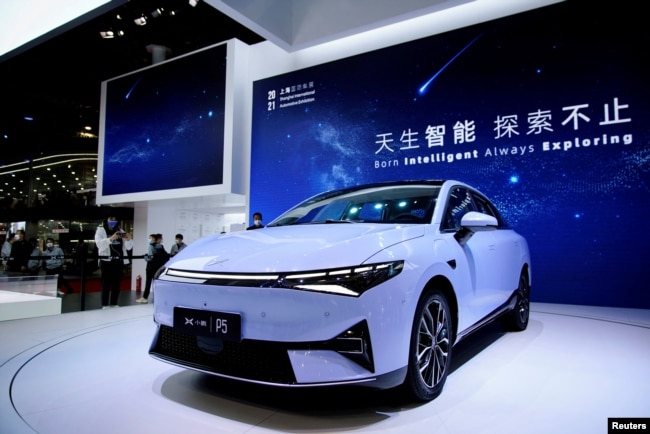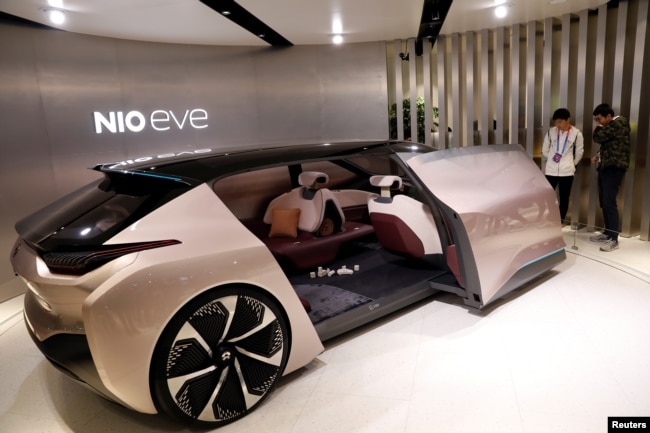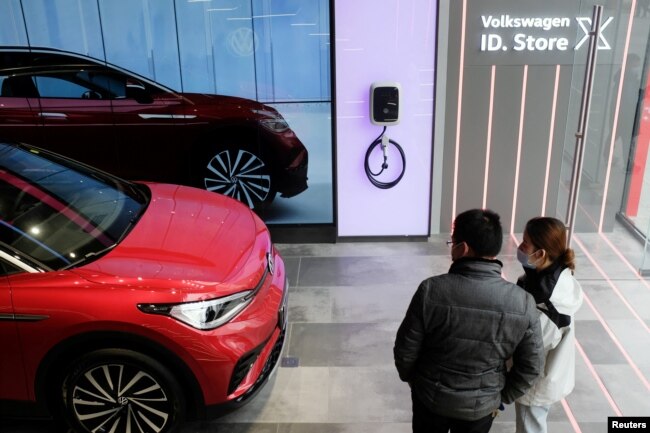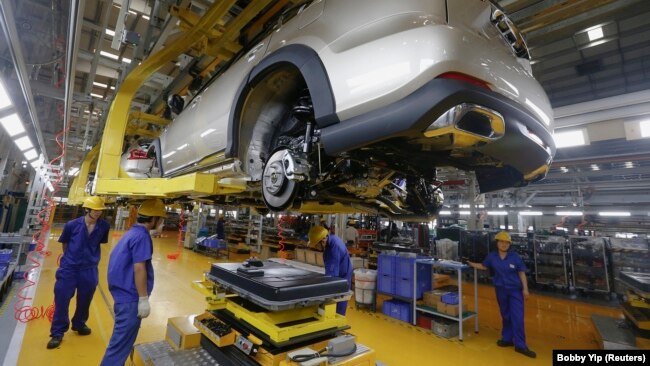EVs、中国市場での熾烈な戦い
ゲームチェンジ!!!
始まりは地球環境・資源問題への関心の高まりを背景に、ヨーロッパメーカーが日本に仕掛けたゲームチェンジだったかと思います。
ガソリン車は長い開発の上に成り立っています、つまり一朝一夕には開発でしない分野。
そこでITに強い中国が一気に参戦、加速させ、今やEV世界をリードしています。
シフトチェンジが遅い日本メーカーは置き去り状態!!
さぁ、今日もVOAで英語を楽しく学びましょう♬
中国の小型EVメーカーが大手自動車メーカーに迫る(和訳)
Small Chinese EV Makers Gain on Big Carmakers
June 13,2022
ゼネラルモーターズやフォルクスワーゲンといった国際的な大手自動車メーカーは、自社の電気自動車(EV)が中国でも売れ続けると考えているかもしれません。しかし、彼らは驚きに直面する可能性があります。
世界最大の自動車市場において、現地の自動車メーカーはすでに大きなシェアを獲得しているのです。中国での自動車販売額は毎年5,000億ドルに上ると推定されています。
スマートな技術を求めるバイヤー
北京の会社員、ティアナ・チェンさんは車の購入を計画したとき、Xpeng、BYD、Nioの3つの中国ブランドから選びました。外車は検討しませんでした。
「ガソリン車を買うのであれば、海外ブランドを検討したかもしれません。」と、29歳の彼女は仕事から家に帰る車の中で言いました。「しかし、私はEVが欲しかったし、テスラ以外に、高度なスマート技術を適切に適用している外国ブランドをほとんど見かけませんでした。」
チェンさんは、外国車ブランドには、自分が求めているものがないと言います。スマートフォンのような "快適さ "をクルマで実現できるEVが欲しいと思っていたのです。
「海外ブランドは、私の生活やライフスタイルとはかけ離れています。」とチェンさんは言います。車内では、モバイル端末でショッピングサイトに接続し、窓や音楽を操作しています。
チェンさんは、電気自動車を購入する多くの中国人の一人です。中国汽車工業協会は、2022年の最初の4カ月間に販売台数が増加したと報告しました。この間、電気自動車やプラグインハイブリッド車の乗用車は、前年比2倍以上の149万台となりました。
この種の技術を搭載した自動車は、中国の乗用車市場の23%を占めています。しかし、ガソリン車の需要が減少したため、自動車販売台数は12%減少しました。
今年、中国のいわゆる新エネルギー車メーカー上位10社には、外国ブランドはほとんど入っていません。唯一の例外は、3位のテスラです。残りはBYD、Wuling、Chery、Xpengなど、すべて中国ブランドです。
中国を牽引するのはBYDです。同社は今年、同国で約39万台のEVを販売しました。これは、世界トップのテスラが中国で販売した台数の3倍以上です。伝統的な自動車メーカーのトップはフォルクスワーゲンの一汽集団で、EV販売台数は15位。
1990年代以降、中国では外国自動車メーカーが乗用車の6~7割を販売していました。しかし、2022年の最初の4ヶ月で、彼らの売上は52%に下がり、4月には43%になりました。
日産のマコト・ウチダチーフはロイターに対し、中国で”4~5年で消滅する可能性がある”ブランドもあると述べています。
ウチダ氏は「地元のブランドは強くなっています。」と述べます。また、中国メーカーのEVの品質は急速に向上しており、数カ月で進歩が見られると付け加えています。ウチダ氏は、海外の自動車メーカーは、新型車の設計、開発、発売を迅速に行う必要があると述べます。そして、「...もし我々が遅ければ、取り残されてしまうだろう。」と警告しています。
ビル・ルッソ氏はクライスラーの元幹部で、現在は上海を拠点にアドバイザリー事業を行うオートモビリティーを率いています。彼は、外国ブランドは中国唯一の成長自動車市場の20%未満を支配しているため、状況を迅速に変える必要があると述べます。
「中国ブランドはEV競争に勝っています。」とルッソ氏は言います。さらに、4輪のスマートフォンのような車を求める消費者の欲求は、今後も変わることはないだろうと述べています。彼はこれを、「伝統的な企業はハイテク・ネイティブではない。 」と問題視しています。
ゼネラルモーターズ(GM)は今、大都市で若い購買層を獲得しようとしています。同社は、2025年までに全世界で350億ドル以上を投じて電気自動車を製造する計画を発表しました。その中には30台以上の新型EVが含まれ、そのうち20台以上は中国です。例えば、GMは今年、すべて電気自動車のスポーツ用多目的車キャデラック・リリックを発売する予定です。
GMは、高速道路での運転支援、高レベルまたは”航空レベル”のサイバーセキュリティ、ワイヤレスでのソフトウェア更新などのスマート技術を使用していると述べています。
速いクルマ?
フォルクスワーゲンは、2026年までに全世界で550億ドルをEVに投じます。その新型ID.シリーズは昨年初めから中国で販売を開始しました。VWは昨年、ID.シリーズを8万台から10万台販売するという目標を達成できませんでした。4月までの販売台数はわずか33,300台です。
海外ブランドにとって懸念されるのは、新型EVが欧米市場向けであることです。自動車は性能を重視し、長持ちするように設計されています。しかし、中国のドライバーは、道路が混雑しているため、時速60キロメートル以上のスピードで走ることはほとんどありません。
フォルクスワーゲンは、中国におけるEVの需要は”スマートカー”の考えと強く結びついていると述べます。フォルクスワーゲンは、現地での研究およびソフトウェアへの投資を増やしています。
国際的な自動車メーカーが引きつける必要があるのは、大都市のお金持ちの人々です。上海の土木技師であるリ・ファユアンさんは、そうした消費者の一人です。
リさんは、昨年BYDの電気自動車を43,000ドルで購入する前に、日本やドイツのブランドを短期間検討しました。
「アメリカのブランドといえば、テスラだけが際立っているように見えます。」と、彼は、プロジェクトに取り組んでいる四川省綿陽市の駐車場に停めたBYD車から言いました。
「他のブランドは、私には競争力があるようにさえ見えません。」と彼は付け加えました。
Small Chinese EV Makers Gain on Big Carmakers
The big international carmakers like General Motors and Volkswagen may think their electric vehicles (EVs) will keep selling well in China. But they could face a surprise.
Local carmakers have already taken a big share of the world’s largest car market. It is estimated that car sales amount to $500 billion in China each year.
Buyers looking for smart technology
When Beijing office worker Tianna Cheng planned to buy a car, she chose between three Chinese brands, Xpeng, BYD, and Nio. She did not consider foreign cars.
"If I was buying a gasoline car, I may have considered foreign brands," the 29-year-old said as she drove home from work. "But I wanted an EV, and other than Tesla, I saw few foreign brands applying advanced smart technology properly."
Cheng said that foreign car brands did not have what she was looking for. She wanted an EV able to give her the "comfort" of having a smartphone-like experience in her vehicle.
"Foreign brands are so far from my life and lifestyle," said Cheng. She uses a mobile device to connect to shopping websites and control the windows and music while she is in her car.
Cheng is one of many Chinese who are buying electric vehicles. The China Association of Automobile Manufacturers reported that sales increased in the first four months of 2022. During that time, the number of electric or plug-in hybrid passenger cars more than doubled from a year earlier to 1.49 million cars.
Vehicles with these kinds of technologies represent 23 percent of China's passenger car market. However, vehicle sales fell 12 percent because of a drop in demand for gasoline cars.
There are almost no foreign brands among China’s top 10 makers of so-called new energy vehicles this year. The only exception is Tesla, which is in third place. All the rest are Chinese brands, from BYD and Wuling to Chery and Xpeng.
China’s leader is BYD. The company has sold about 390,000 EVs in the country this year. That is more than three times as many as worldwide leader Tesla sold in China. The top-ranked traditional carmaker is Volkswagen's FAW Group, in 15th place for EV sales.
Since the 1990s, foreign carmakers sold 60 to 70 percent of the passenger cars in China. But in the first four months of 2022, their sales went down to 52 percent, and in April it was at 43 percent.
Nissan chief Makoto Uchida told Reuters that some brands "could disappear in three to five years" in China.
"Local brands are becoming stronger," said Uchida. He added that the quality of EVs from Chinese makers had improved quickly, with progress being made in the space of months. He said foreign carmakers had to move quickly in the design, development and launch of new models. He warned, “…If we were slow, we would be left behind."
Hi-technology natives
Bill Russo is a former Chrysler executive who now heads the Shanghai-based advisory business Automobility. He said foreign brands need to change the situation quickly because they control less than 20 percent of China's only growth auto market.
"Chinese brands are winning the race to EV," said Russo. He added that consumers' desire for cars that are more like smartphones on four wheels is not likely to change. He considered this a problem because, "Traditional companies are not hi-tech natives."
General Motors (GM) is now trying to gain younger buyers in big cities. The company announced plans to spend more than $35 billion worldwide by 2025 to make electric cars. That includes more than 30 new EVs, over 20 of them in China. This year, for example, GM will launch the all-electric Cadillac Lyriq sports utility vehicle.
GM said it was using smart technologies including driver assistance on highways, high-level or "aviation-grade" cyber security and wireless software updates.
Fast cars?
Volkswagen is spending $55 billion worldwide on EVs by 2026. Its new ID. series began selling in China early last year. VW missed its goal of selling 80,000 to 100,000 ID. cars last year. It has sold only 33,300 cars through April.
One concern for foreign brands is that their new EVs are aimed at the American and European markets. The cars are designed for performance and to last a long time. But drivers in China rarely can drive faster than 60 kilometers an hour because of crowded roads.
Volkswagen said EV demand in China was strongly linked to the "smart car" idea. It is investing more in local research and software.
Among those the international carmakers need to attract are people in big cities with money to spend. Li Huayuan, a civil engineer from Shanghai, is one of those consumers.
Li briefly considered Japanese and German brands before he bought his BYD electric car last year for $43,000.
"Seems to me only Tesla stands out when it comes to American brands," he said from his parked BYD car in the city of Mianyang in Sichuan where he is working on a project.
"The other brands don't even look competitive to me," he added.
Words in This Story
brand – n. a group of products made by a company that shares a name and certain qualities
plug-in hybrid – adj. a vehicle that is powered by both electricity and gasoline that can be connected to an electricity system to add power to its battery
consumer – n. a person who buys goods and services
cyber – adj. dealing with computers
update – n. new, improved, or fixed software which replaces older versions of the same software



